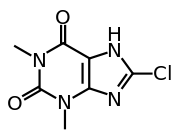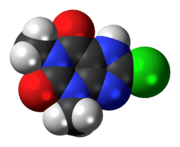8-Chlorotheophylline
 | |
 | |
| Systematic (IUPAC) name | |
|---|---|
|
8-chloro-1,3-dimethyl-7H-purine-2,6-dione | |
| Clinical data | |
| Legal status |
|
| Routes of administration | Oral |
| Identifiers | |
| CAS Number |
85-18-7 |
| ATC code | None |
| PubChem | CID 10661 |
| ChemSpider |
10211 |
| UNII |
GE2UA340FM |
| ChEBI |
CHEBI:59771 |
| ChEMBL |
CHEMBL88611 |
| Chemical data | |
| Formula | C7H7ClN4O2 |
| Molar mass | 214.61 g/mol |
| |
| |
| | |
8-Chlorotheophylline, also known as 1,3-dimethyl-8-chloroxanthine, is a stimulant drug of the xanthine chemical class, with physiological effects similar to caffeine.[1] It is combined with pharmaceutical drugs to form stable salts, such as the antiemetic dimenhydrinate, which is broken down into diphenhydramine, the active antiemetic, and 8-Chlorotheophylline, to ward off drowsiness.
See also
References
- ↑ S H Snyder, J J Katims, Z Annau, R F Bruns, and J W Daly (May 1, 1981). "Adenosine receptors and behavioral actions of methylxanthines". PNAS 78: 3260–3264. doi:10.1073/pnas.78.5.3260.
| ||||||||||||||||||||||||||||||||||||||||||||||||||
This article is issued from Wikipedia - version of the Tuesday, May 05, 2015. The text is available under the Creative Commons Attribution/Share Alike but additional terms may apply for the media files.